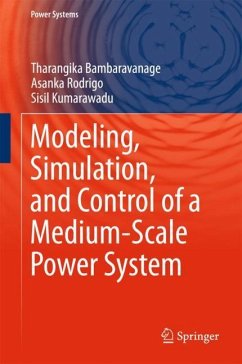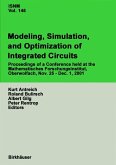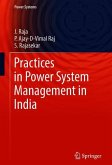This book highlights the most important aspects of mathematical modeling, computer simulation, and control of medium-scale power systems. It discusses a number of practical examples based on Sri Lanka's power system, one characterized by comparatively high degrees of variability and uncertainty. Recently introduced concepts such as controlled disintegration to maintain grid stability are discussed and studied using simulations of practical scenarios.
Power systems are complex, geographically distributed, dynamical systems with numerous interconnections between neighboring systems. Further, they often comprise a generation mix that includes hydro, thermal, combined cycle, and intermittent renewable plants, as well as considerably extended transmission lines. Hence, the detailed analysis of their transient behaviors in the presence of disturbances is both highly theory-intensive and challenging in practice. Effectively regulating and controlling powersystem behavior to ensure consistent service quality and transient stability requires the use of various schemes and systems.
The book's initial chapters detail the fundamentals of power systems; in turn, system modeling and simulation results using Power Systems Computer Aided Design/Electromagnetic Transients including DC (PSCAD/EMTDC) software are presented and compared with available real-world data. Lastly, the book uses computer simulation studies under a variety of practical contingency scenarios to compare several under-frequency load-shedding schemes. Given the breadth and depth of its coverage, it offers a truly unique resource on the management of medium-scale power systems.
Power systems are complex, geographically distributed, dynamical systems with numerous interconnections between neighboring systems. Further, they often comprise a generation mix that includes hydro, thermal, combined cycle, and intermittent renewable plants, as well as considerably extended transmission lines. Hence, the detailed analysis of their transient behaviors in the presence of disturbances is both highly theory-intensive and challenging in practice. Effectively regulating and controlling powersystem behavior to ensure consistent service quality and transient stability requires the use of various schemes and systems.
The book's initial chapters detail the fundamentals of power systems; in turn, system modeling and simulation results using Power Systems Computer Aided Design/Electromagnetic Transients including DC (PSCAD/EMTDC) software are presented and compared with available real-world data. Lastly, the book uses computer simulation studies under a variety of practical contingency scenarios to compare several under-frequency load-shedding schemes. Given the breadth and depth of its coverage, it offers a truly unique resource on the management of medium-scale power systems.








